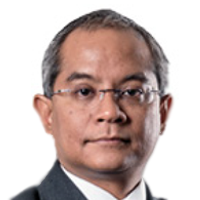Events
43rd ASEAN+3 Bond Market Forum (ABMF) Meeting 42nd ASEAN+3 Bond Market Forum (ABMF) Meeting 41st ASEAN+3 Bond Market Forum (ABMF) Meeting 40th ASEAN+3 Bond Market Forum (ABMF) Meeting Sustainable Finance in the Indo-Pacific 39th ASEAN+3 Bond Market Forum (ABMF) Meeting 38th ASEAN+3 Bond Market Forum (ABMF) Meeting 37th ASEAN+3 Bond Market Forum (ABMF) Meeting 36th ASEAN+3 Bond Market Forum (ABMF) Meeting Workshop on Scaling Up Green Finance in Indonesia Capacity Building Workshop on the Role of Financial Institutions in Supporting Sustainable Development Collective Investment Scheme Transactions in ASEAN+3: Benchmark Product and Market Infrastructure Design Local Currency Collateral for Cross-Border Financial Transactions - Policy Recommendations from the Cross-Border Settlement Infrastructure Forum ABMF-CSIF Webinar: Accelerated Securities and Its Impact 35th ASEAN+3 Bond Market Forum (ABMF) Meeting Sustainable Bond Market Developments in Emerging East Asia Asian Impact Webinar: Promoting Social Bonds for Impact Investments in Asia Green Social Sustainable Bonds Series 4: Creating Sustainable and Responsible Investment Portfolios ADB-GLEIF Joint Webinar Series on Legal Entity Identifier (LEI) Easier Capital Raising with Green and Sustainable Labeling Green Social Sustainable Bonds Series 3: Role of Financial Institutions in Supporting Sustainable Development Scaling Up Sustainable Finance in ASEAN: The Malaysian Journey ABMF Webinar on Comparative Analysis of Capital Market Laws and Regulations based on Bond Market Guides 2016 - 2020 Workshop on Bond Market Development in Emerging East Asia: Developing Cambodia's Government Bond Market Joint ABMF-CSIF Workshop on Standardization of FX reporting & Tax KYC and Cross-Border Use of Local Currency Collateral of ASEAN+3 Recent Development and Trends in Asian Bond Markets Developing Social Bond Markets in Asia: Social Impacts in the Asian Context Developing Social Bond Markets in Asia: A Primer on Social Bonds Joint 34th ASEAN+3 Bond Market Forum and 21st Cross-Border Settlement Infrastructure Forum (CSIF) Webinar 33rd ASEAN+3 Bond Market Forum Meeting and Other Relevant Events ABM November 2019 Launch 32nd ASEAN+3 Bond Market Forum Meeting and 19th Cross-Border Settlement Infrastructure Forum (CSIF) Meeting Workshop on Bond Market Development in Emerging East Asia Workshop on Green Finance in Viet Nam ABM June 2019 Launch 31st ASEAN+3 Bond Market Forum Meeting and Other Relevant Events 13th Asia Bond Markets Summit 2019 Asia Bond Markets Summit - European Edition ABMF January 2019 13th Asian Bond Markets Summit 2018 2018 Bond Market Workshop ABMF September 2018 2018 ABO Website Launch Asia Bond Monitor June 2018 Launch ABMF June 2018 27th ASEAN+3 Bond Market Forum Meetings 2017 ABM November Launch 2017 Capacity Building 2017 ABM June Launch 2016 ABM November Launch 2016 Capacity Building 2016 ABM June Launch

ASEAN Round Table Series
CIMB ASEAN Research Institute (CARI) in collaboration with ASEAN Business Club (ABC) and Asian Development Bank (ADB)
Broadening investor base in ASEAN bond markets
- Thanat Khoman Room, Level 31, Menara CIMB, Jalan Stesen Sentral 2,
- Kuala Lumpur Sentral, Kuala Lumpur
- 24th November 2017, Friday
- Time: 9:30 am - 12:30 pm
...
...






